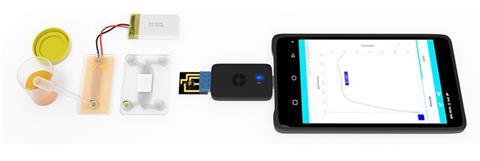An electrochemical sensor that can quickly find out whether a urinary tract infections (UTI) is caused by bacteria or not could become the latest weapon against antibiotic resistance.
Researchers at McMaster University in Canada have created a test on a chip that uses synthetic nucleic acid probes – RNA-cleaving DNAzymes (RCDs) – to detect Escherichia coli. ‘This is the first example of a DNAzyme test combined with electrical readout that is evaluated and proven using clinical samples,’ comments Leyla Soleymani, one of the scientists who led the study. Because the test avoids the need to culture bacteria, it returns results in less than an hour.

The test targets E. coli because it causes the vast majority of UTIs, explains Soleymani’s colleague Yingfu Li. Usually, it takes more than 18 hours to diagnose a bacterial infection, Soleymani adds, meaning that doctors might not prescribe the most effective antibiotics – a hotbed for creating antibiotic-resistant bacteria. If tests were quicker, physicians could be more precise.
Researchers have therefore previously developed faster tests. For example, some systems have used the polymerase chain reaction to detect the bacteria’s genetic material – but these approaches are complex and costly.
Now, the researchers built on RCD sensors previously developed by Li’s team. His group has a library of synthetic DNA molecules from which they can select one the ones that recognise specific substances. The RCDs are self-cleaving oligonucleotides that include a DNA barcode, which they release when they recognise their target substance. The new sensor uses RCDs that identifies molecules released by heating urine samples containing E. coli. The RCDs release DNA barcodes bound to methylene blue dye molecules, which electrochemical biosensors can detect.
Li, Soleymani and their colleagues attached their RCDs to a star-shaped, nanostructured electrode on a small chip that holds liquid samples. When a solution containing molecules released by E. coli reaches the electrode, the RCDs release their barcodes, generating an electrical signal. The barcodes diffuse to another nearby star-shaped electrode containing a DNA sequence designed to bind with them, which generates another electrical signal. This electrochemical test has ‘a really high sensitivity’, says Soleymani, thanks in part to the nanostructured electrodes’ high surface area.
Peiying Hong from the King Abdullah University of Science and Technology in Saudi Arabia, notes that the system has a high signal-to-noise ratio. That ‘allows them to differentiate E. coli in a conclusive manner relative to the other bacterial non-targets’, Hong says. She notes that the test is unusual in having an electrical output rather than changing colour. ‘One can read the results directly from a portable app or electronic device,’ Hong observes. ‘However, the device is able to obtain only qualitative measurements since the signals do not respond linearly to the increase in bacterial load.’
The McMaster team now wants to expand on the system to analyse several different bacteria, including antibiotic resistant ones, says Soleymani. ‘We are also looking for a commercialisation partner for bringing this test to the market,’ she adds.
References
R Pandey et al, Nature, 2021, DOI: 10.1038/s41557-021-00718-x












No comments yet